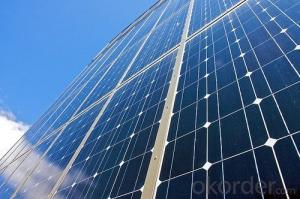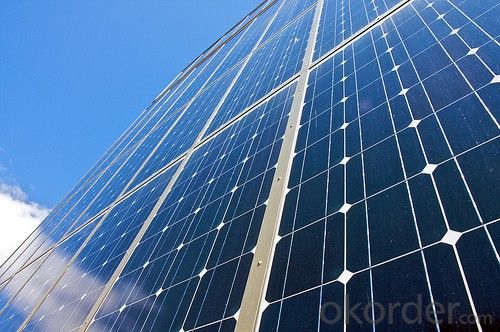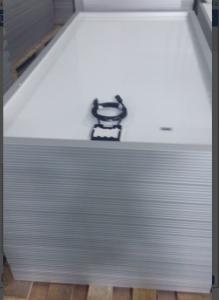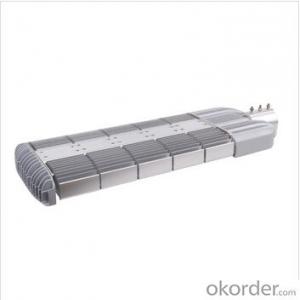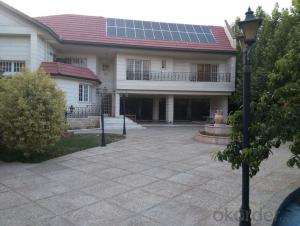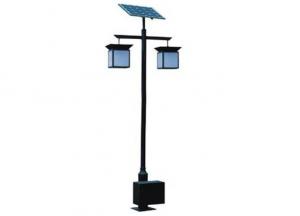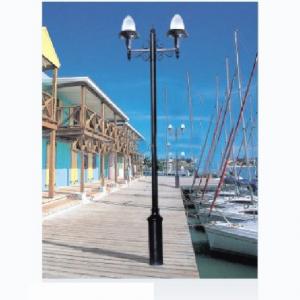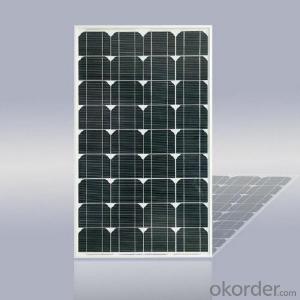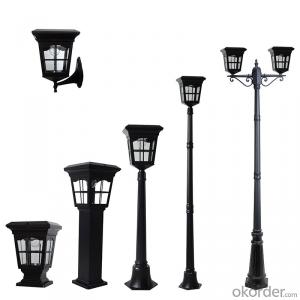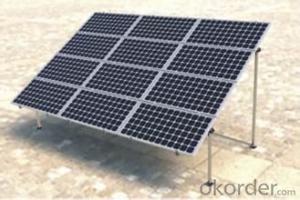Highest Quality Solar Panels for Yard Lights - Solar Energy Solutions
- Loading Port:
- China main port
- Payment Terms:
- TT OR LC
- Min Order Qty:
- 10000 watt
- Supply Capability:
- 100000000 watt/month
OKorder Service Pledge
OKorder Financial Service
You Might Also Like
Specification
Production description
Monocrystalline Silicon Solar Panel (60-65W)
• 10 years 90% output warranty
• 20 years 80% output warranty
• High conversion efficiency mono/poly-crystalline amorphous silicon solar cells
• Modules incorporate high performance bypass diodes to minimize the power drop caused by shading
• High transmittance, low-iron tempered glass
• High performance EVA encapsulate to prevent destroying and water.
• AI frame: without screw, corner connection. 8 holes on the frame can be installed easily
• Good performance of preventing from atrocious weather such as wind and hails
• Certifications: CE IEC TUV VDE UL, Class I
Details
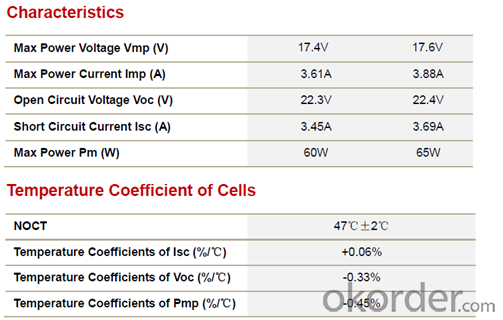
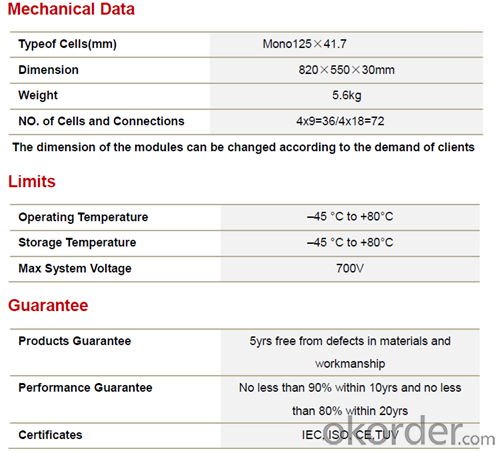

Images
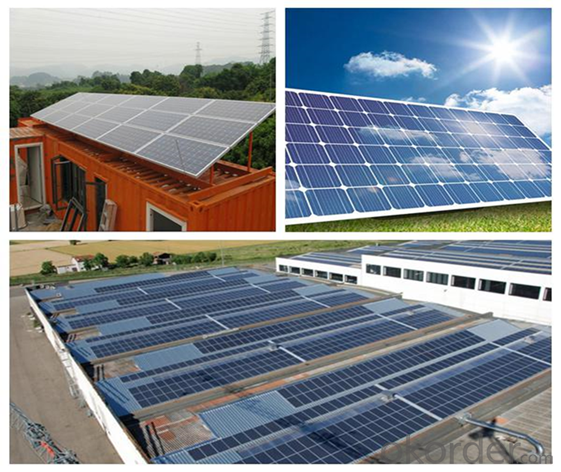
FAQ
We have organized several common questions for our clients,may help you sincerely:
1.What price for each watt?
It depends on the quantity, delivery date and payment terms,
2.How do you pack your products?
We have rich experience on how to pack the panels to make sure the safety on shipment when it arrives at the destination.
- Q: Can solar panels be installed on an RV or camper?
- Yes, solar panels can be installed on an RV or camper. In fact, many people choose to install solar panels on their recreational vehicles to harness renewable energy and reduce reliance on traditional power sources while on the road. Solar panels can provide a sustainable and efficient way to charge batteries, power appliances, and even run electrical systems in an RV or camper.
- Q: How long does it take to recoup the investment in solar panels?
- The length of time it takes to recoup the investment in solar panels can vary depending on factors such as the cost of the system, available incentives, electricity usage, and local solar conditions. On average, it usually takes between 5 to 10 years to recover the initial investment through energy savings. However, with the declining costs of solar panels and the potential for government incentives, this payback period may be shorter in certain cases.
- Q: Can solar panels be used in areas with high winds?
- Yes, solar panels can be used in areas with high winds. However, it is important to ensure that the solar panels are properly installed and securely mounted to withstand the high wind conditions. Reinforced mounts and sturdy frames are typically used to anchor the panels securely in place. Additionally, frequent inspections and maintenance might be required to ensure the panels remain intact and functional in such environments.
- Q: Can solar panels be installed on asphalt shingles?
- Yes, solar panels can be installed on asphalt shingles. However, it is important to ensure that the shingles are in good condition and can support the weight of the panels. Proper installation techniques and mounting systems designed for asphalt shingles should be used to prevent any damage to the roof.
- Q: Can solar panels be used for powering a water treatment plant?
- Yes, solar panels can be used to power a water treatment plant. Solar energy can be converted into electricity to run the necessary equipment and processes involved in treating water, making it a sustainable and environmentally friendly option for powering such facilities.
- Q: Can solar panels power an entire home?
- Yes, solar panels can power an entire home. The number of solar panels required will depend on the energy needs of the home and the efficiency of the panels. With the right setup and sufficient sunlight, solar panels can generate enough electricity to cover the energy consumption of a household.
- Q: How do solar panels affect the property taxes?
- Solar panels can potentially affect property taxes, but the impact varies depending on the jurisdiction. In some areas, installing solar panels may increase the assessed value of a property, leading to higher property taxes. However, many states and municipalities offer tax incentives and exemptions that can offset any potential increase. It is advisable to consult with local tax authorities or a tax professional to understand the specific implications for a particular property.
- Q: I am writing some mock legislation for a school club and I need to know some of the environmental effects of solar panels. Also, where can I find specific studies(like from colleges and/or universities) proving these benefits as well as benefits and reasons of going green.
- Hi there, as a great starting point take a look here okorder Should give you most of what you require
- Q: How do solar panels affect the overall sustainability of a building?
- Solar panels positively affect the overall sustainability of a building by reducing reliance on non-renewable energy sources and decreasing carbon emissions. They generate clean and renewable energy from the sun, reducing the building's environmental footprint and contributing to a greener future. Additionally, solar panels can lower energy costs, increase energy efficiency, and provide energy independence, making the building more resilient and sustainable in the long run.
- Q: The inverter I am using gets the required 2 DC volts from the solar panel, but fo some reason it just won't output the 0 AC voltage. When the inverter is hooked to a car battery, it works just fine off the same 2 DC rating. Help me out please...
- There could be a couple of reasons why it isn't working. First, 2V panels actually put out a considerably higher voltage because it is presumed that they will be used to charge a 2Vdc battery. That requires applying a voltage greater than 2Vdc, and usually there is a solar controller that regulates the solar power to the battery. It also has a voltage drop. Look at the first reference reference, and you will see these values for a particular panel: Voc: 2.6V (open circuit voltage) Vmp: 7.2V (voltage at maximum power point) Voc is the voltage the panel produces under standard sunlight and temperature conditions (25°C), with no load applied. As load is applied, the voltage drops (see reference 2). Power is the product of current times voltage, so at one set of conditions (namely at Vmp) maximum power is available from the panel. Your inverter might not be working for either of two reasons: ) it has input protection circuitry that locks out operation when it senses an overvoltage, as in the 2.6V open circuit voltage, or 2) the panel does not produce enough current and the voltage from the panel collapses under excessive load. For example, if you load your inverter to 20W, then nominally the 2VDC input to the inverter must supply 20W/2V/eff = 0A/eff Assuming the inverter has an efficiency of 80%, the input current required is: 0A/.8 = 2.5A A solar panel operating at maximum power would need a rating of about: 2.5A x 7.2V = 25W Is your panel that big? The other option, as mentioned by others, is to charge a battery that runs the inverter. Other nuances: Voc increases as temperature decreases. Sunlight intensity varies (obviously), so the panel may produce less than rated power. The power specifications often are printed on the back side of the panel.
Send your message to us
Highest Quality Solar Panels for Yard Lights - Solar Energy Solutions
- Loading Port:
- China main port
- Payment Terms:
- TT OR LC
- Min Order Qty:
- 10000 watt
- Supply Capability:
- 100000000 watt/month
OKorder Service Pledge
OKorder Financial Service
Similar products
Hot products
Hot Searches
Related keywords
